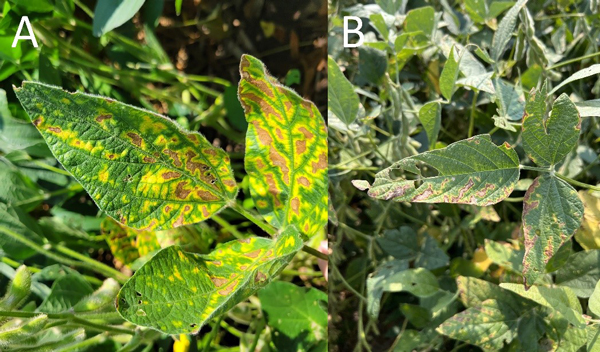The K-State Plant Disease Diagnostic Lab has implemented a new Soybean Sudden Death Syndrome (SDS) molecular diagnostic tool to help growers properly identify this disease. This new SDS molecular test is faster and has higher detection capabilities than conventional methods.
Although SDS root infection happens early in the season, foliar symptoms may show up later in the season at the reproductive growth stages. SDS foliar symptoms (Figure 1A) are typically described as interveinal chlorosis/necrosis and can be confused with insect damage, such as Dectes stem borer and other diseases such as stem canker and brown stem rot. In addition, some triazole fungicides when sprayed during hot and dry weather conditions are also known to cause foliar phytotoxicity symptoms that are similar to SDS symptoms (Figure 1B). Check out this online resource for diagnosing interveinal chlorosis in soybeans: Diagnosing Interveinal Chlorosis In Soybeans – It’s not just SDS (Crop Protection Network)

Figure 1. Interveinal chlorosis caused by (A) sudden death syndrome and (B) triazole fungicide. Photos by K-State Plant Pathology.
To confirm SDS, the K-State Plant Disease Diagnostic Lab offers a molecular diagnostic test that is fast and increases detection capabilities. Soybeans commonly have multiple diseases present and diagnosing based on symptoms alone is not recommended. For more information on how to submit a sample, contact your local KSRE extension agent and follow the instructions below.
Lab Submission Form: Include as much information as possible
Services and Fees: Within KSRE: $50 | Individuals outside KSRE: $70
Collection/Shipping Guidelines: Submit entire plants including the root system. The SDS molecular testing is performed on the taproot/lateral roots, therefore an intact root system is crucial.
If SDS is detected in a field, sampling for Soybean Cyst Nematode (SCN) is recommended. SDS and SCN commonly occur together and, in order to make the best management decisions possible, growers need to know which pathogens they are dealing with.
SCN Soil Sampling Recommendation
Questions? Call (785-532-1383) or email (clinic@ksu.edu)
Chandler Day, Crop Diagnostician
chandlerday@ksu.edu
Rodrigo Onfore, Row Crop Extension Pathologist
onofre@ksu.edu
Tags: soybeans Sudden Death Syndrome Plant Disease Diagnostic Lab SDS